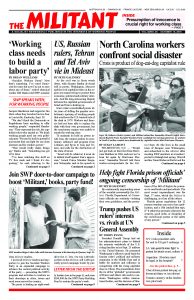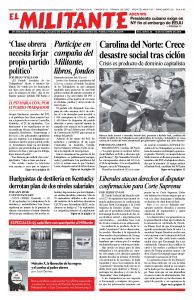October 18, 1993
Dealing another blow to the myth of “humanitarian” intervention, President Bill Clinton has significantly expanded U.S. forces and armor in Somalia.
The battle in the streets of Mogadishu, in which hundreds of Somalis were killed and wounded and significant casualties were inflicted on U.S. troops, has led to a big debate within ruling-class circles on what should be done.
There’s one simple step that should be taken. That is for the Clinton administration to immediately withdraw all U.S. troops and its military hardware from Somalia and for the 28,000-strong UN occupation force to do the same.
U.S. forces entered Somalia intent on using the plight of the Somali people to reassert Washington’s right to militarily intervene in so-called trouble spots.
October 18, 1968
A noteworthy feature of the history of the Militant, whose fortieth anniversary we celebrate this year, has been its role as a campaigner for socialism in national and local elections. Over the years, the Militant has served as the campaign paper of the Socialist Workers Party.
Prior to the 1930s, it was unthinkable for the mildest of socialists to support any major-party, capitalist politician. Yet as the very height of labor radicalism in the ’30s, the Communist and Socialist parties both began promoting the ruinous anti-Marxist notion of supporting “lesser evil” capitalist politicians.
From the outset this was opposed by the Socialist Workers Party and the Militant, which continued the fight for independent labor and socialist political action.
October 16, 1943
The order of the War Labor Board providing for the discharge of hundreds of drivers by the New York milk companies in order to conserve gas and rubber furnishes an excellent example of how in the functioning of the capitalist system under war conditions, monopoly capitalism invariably comes out on top.
It may be argued that it is necessary to conserve gas and rubber, but the milk companies are the gainers from that necessity and the workers are the losers. The milk companies have had a hard time to get rid of almost a thousand drivers were it not for the fact that war conditions enable the government to step in and use its power on their behalf.
It is war conditions that bring out the hold which monopoly capitalism has upon the economic life of the nation.

